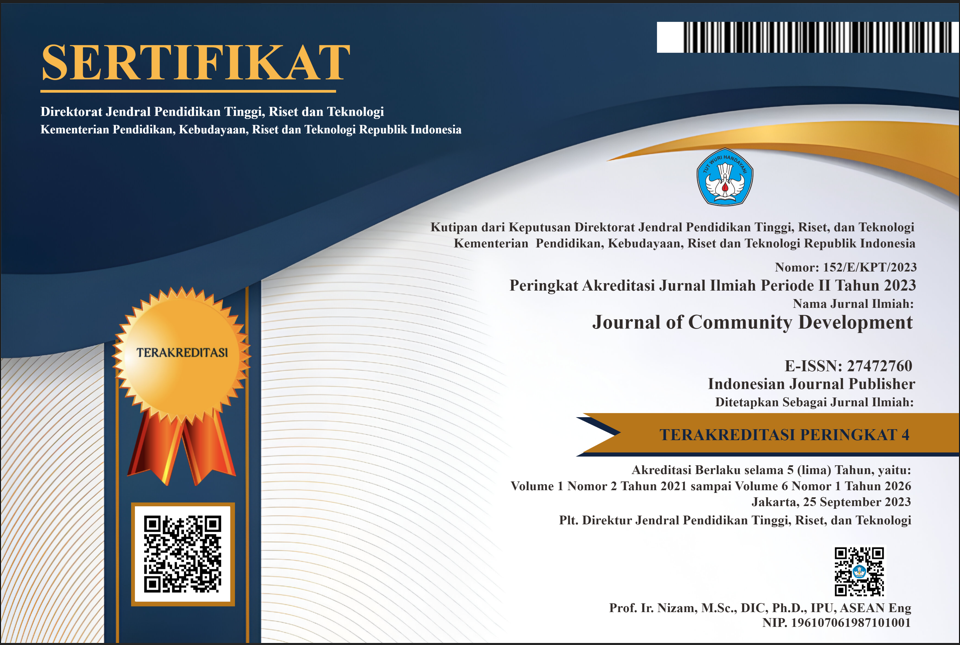Pemberdayaan Masyarakat Desa Banguntapan Bantul Melalui Pembuatan Unit Usaha Tempe Kedelai
DOI:
https://doi.org/10.47134/comdev.v5i1.207Keywords:
Small industry, tempe, product branding, innovationAbstract
Promoting the expansion of small and medium industries (IKM) is crucial for stimulating national economic development. Small and medium-sized enterprises (SMEs) operate in several industries and have a crucial role in augmenting the earnings of those with lower socioeconomic status. The importance of small and medium-sized enterprises (SMEs) in national economic development is highly significant, particularly during times of economic crisis. This was particularly obvious in Indonesia's recent economic downturn, where SMEs had greater resilience in confronting these problems compared to large corporations, which often experienced stagnation or even ceased operations. Science and technology are becoming increasingly crucial for the advancement of small firms, including the tempe sector. The small tempe sector has emerged as a significant element of the economy in numerous nations, exerting a crucial influence on stimulating economic growth at the regional level. Nevertheless, like to other industries of a smaller scale, the tempeh sector encounters several challenges, including issues pertaining to production effectiveness, product excellence, and environmental sustainability. By organizing community service activities, many programs have been established, such as promoting the significance of branding in product marketing, fostering innovation in product development, and offering guidance on calculating the Cost of Goods Production (HPP). The results indicate that the prospective partner has the capability to oversee an IKM business division focused on soybean tempeh under the TempeMU brand.
Downloads
References
Agusti, V. N., Chastity, V., Olczewski, P. S. & Hayati, K. R. (2022). Olahan Keripik Tempe Sagu dan Pembinaan UMKM Kelurahan Kupang Krajan Kecamatan Sawahan Surabaya. KARYA UNGGUL-Jurnal Pengabdian Kepada Masyarakat, 1, 291-301.
Amahoroe, R. A., Arifin, M. & Solihin, H. (2020). Penerapan desain praktikum berbasis Stem pada pembuatan tempe dari fermentasi biji nangka (artocarpus heterophyllus) untuk meningkatkan literasi sains siswa smk. Molluca Journal of Chemistry Education (MJoCE), 10, 89-100.
Arfiana, C. & Wardayani, W. (2023). Implementation of accounting based financial governance as an effort to improve msmes tempeh creacker Bu Erna. Enrichment: Journal of Management, 13, 1913-1922.
Ayuningtyas, R. R., Ekowati, T. & Prastiwi, W. D. (2022). Added Value of Soybean Into Tempeh Chips in Kedungjenar Home Industry Centre, Blora Regency. Jurnal Manajemen & Agribisnis, 19, 481-481.
Herawati, C. & Sudar, S. (2022). Inspeksi Pangan Berbasis Risiko Dalam Rangka Pencegahan Penyakit Bersumber Pangan. Dimasejati: Jurnal Pengabdian Kepada Masyarakat, 4, 155-174.
Himarosa, R. A., Sudarisman, S., Bisandyaloka, A. & Sofyantoro, F. (2022). Pengembangan Unit Usaha Tempe melalui Aplikasi Mesin Giling Kedelai Teknologi Screw. Jurnal Pengabdian Pada Masyarakat, 7, 298-307.
Kusnayat, A., Puspitasari, S. Y., Herdiani, A., Hafidh, M. Y. A., Sardi, I. L. & Martini, S. (2019). Implementasi Alat Pengupas dan Penyaring Kulit Ari Kacang Kedelai Untuk Meningkatkan Kapasitas Produksi Tempe CV. Mitra Pangan Sejahtera, Bandung. Charity: Jurnal Pengabdian Masyarakat, 2.
Lusiah, L., Parulian, E., Saragih, L. M. S., Tarwiyah, T. & Wongsosudono, C. (2023). Training On Making" Soybean Tempe" To Increase Family Income For Local Housewives In Silalas Village, Medan. International Journal Of Community Service, 3, 359-362.
Mukaffi, Z., Rozi, C. & Susanti, R. A. (2019). Competitive Strategy for Micro, Small Business and Medium Food Industry Sector. 2018 International Conference on Islamic Economics and Business (ICONIES 2018), Atlantis Press, 179-186.
Novianisa, A., Syafitri, K., Rahmat, S. & Putra, E. M. R. (2023). Analysis of Business Feasibility Studies in MSMEs Tahu and Tempe Business Success Jaya Mahato Village Tambusai North. InJEBA: International Journal of Economics, Business and Accounting, 1, 42-50.
Ramadani, A. H. & Ridlwan, A. A. (2022). Mesin Pengupas Kulit Ari Kedelai Otomatis untuk Meningkatkan Produktivitas Industri Kecil Tempe di Tulungagung. Abimanyu: Journal of Community Engagement, 3, 29-39.
Romli, O., Putra, A. R. & Nurdiansyah, O. (2022). Diversification And Innovation Of Tempe Processed Product’s To Improve Competitiveness In Small And Medium-Sized Enterprises Tempe Business In Mekar Baru Village. International Journal of Engagement and Empowerment, 2, 150-157.
Selvi, A. & Das, N. (2019). Fermented soybean food products as sources of protein-rich diet: an overview. Fermented food products, 167-180.
Wiloso, E. I., Sinke, P., Muryanto, Setiawan, A. A. R., Sari, A. A., Waluyo, J., Putri, A. M. H. & Guinée, J. (2019). Hotspot identification in the Indonesian tempeh supply chain using life cycle assessment. The International Journal of Life Cycle Assessment, 24, 1948-1961.
Wisnujati, A., Yusuf, M. & Hudiatma, A. (2022). Karakterisasi Pengecoran Poros Berulir (Screw) dengan Variabel Paduan Unsur Titanium Boron dan Magnesium. Jurnal Rekayasa Mesin, 13, 29-36.
Downloads
Published
How to Cite
Issue
Section
License
Copyright (c) 2024 Andika Wisnujati, Linda Kusumastuti Wardana, Syamsul Ma’arif

This work is licensed under a Creative Commons Attribution 4.0 International License.







